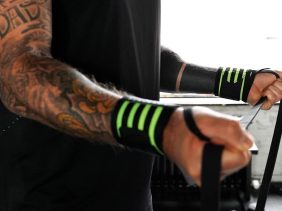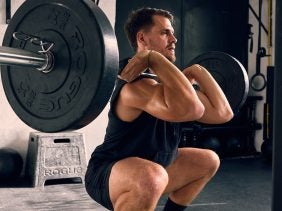Your Go-To Shopping List for Healthy Muscle Building
 © foodspring
© foodspring
Got that burning feeling in your muscles from doing squats, deadlifts, and bench presses? Great job! But if all that effort is really going to pay off, you need to do more than lift heavy weights—you also need to think carefully about what you eat after your workout. Serious muscle building requires healthy fats, complex carbohydrates, and, most importantly, enough protein every day. When you’re training intensively, you can eat up to 2.2 g of protein per kg of body weight without any problems. However, as recent studies have shown, anything above this has no additional benefit for your body. For a person weighing 70 kg, this means that they can consume up to 154 g of protein per day to help them build their muscles effectively.
Whether you’re looking to build muscle, improve your mental health and general well being, or simply increase your everyday energy levels, your diet needs a good mix of macronutrients—think fats, proteins, and carbohydrates—but also micronutrients, too. Micronutrients are the vitamins and minerals that your body needs to support your metabolism and all the other processes in your body. And what micronutrients need is a varied diet—otherwise your body simply can’t absorb them. To help you get more variety into your diet and break free from an endless cycle of chicken, broccoli, and rice, we’ve put together a handy shopping list to keep your daily meal plan fresh and exciting.
Meat & Fish
Animal products are a great way to get plenty of protein into your diet because they usually have a high protein content and animal proteins are particularly easy for your body to digest. This is because proteins are made up of different amino acids. The composition of animal proteins is similar to that of humans, which means they can be absorbed faster than plant proteins.
High-quality organic products are best because, as well as being better for the animals and the environment, the meat is also less contaminated with antibiotics, hormones, etc.
- Chicken breast: 31 g protein per 100 g
- Tuna: 29 g protein per 100 g
- Beef: 26 g protein per 100 g
- Prawns: 24 g protein per 100 g
- Salmon: 20 g protein per 100 g
- Trout and sardines: approx. 19.5 g protein per 100 g
- Cod: 18 g protein per 100 g
Looking for some dinner inspiration? Why not add some smoked salmon to your pasta for a quick and easy meal, or try out our Miso Cod with Sesame Broccoli for the perfect dinner with friends.
Veggies, Legumes & Cereals
It’s also easy to meet all your protein needs with a plant-based diet. In percentage terms, plant-based foods contain slightly less protein than animal products (based on a comparison of the raw ingredients), but they are also full of complex carbohydrates that keep you feeling fuller for longer without causing your blood sugar to spike rapidly. Studies show that it makes no difference to your muscle building whether the protein in your diet comes from animal or plant sources. However, your body can better utilize plant proteins if you eat a range of different protein sources with complementary amino acids, e.g. combinations like beans and rice.
- Red lentils: 26 g protein per 100 g
- Beans: 21 g protein per 100 g
- Seitan: 21 g protein per 100 g
Seitan is a meat-like product made from wheat gluten. It’s an easy substitute for the meat in recipes like our Sweet Potato Chicken Bowl and a great way to transform any dish into a vegetarian alternative.
- Chickpeas: 19 g protein per 100 g
- Oatmeal: 14 g protein per 100 g
- Quinoa: 12 g protein per 100 g
- Soybeans and tofu: 8 g protein per 100 g
- Kale: 4.3 g protein per 100 g
Vegan protein powders are also available and are just as creamy. Our vegan shake is both gluten and soy free and provides 21 g of protein per serving.
Dairy Products & Eggs
Just as with meat and fish, it’s a good idea to check the origin of the products you are eating. Wherever possible, always go for local products. Weekly markets or organic stores can be good alternatives if you don’t live near to a farm. If you’re lucky, the sellers will be able tell you more about the origin of their products and how the animals are reared. Milk from grass-fed cows can also be better for your health. So it’s a win-win for everyone—the animals, the sellers, and you yourself.
- Parmesan: 33-38 g protein per 100 g
- Low-fat quark: 13 g protein per 100 g
- Eggs: approx. 12 g protein per egg
- Cottage cheese: 11 g protein per 100 g
- Greek yogurt: 10 g protein per 100 g
Not sure what to do with cottage cheese other than spread it on some bread? Why not try tuna wraps for a quick, protein-packed lunch.
Snacks & Sweet Treats
Just because you want to build muscle doesn’t mean you can’t treat yourself to a few snacks and sweets. There are loads of great alternatives to traditional candy bars, store-bought cakes and pastries that contain a lot less sugar and additives, and will still satisfy your craving for something sweet.
- Homemade protein cookies: 5 g protein per serving
- Peanut butter: 30 g protein per 100 g—perfect for our Protein Peanut Butter Chocolate Bars or Chocolate Peanut Butter Dates
- Vegetables with dip: With the right dip, vegetable sticks make a protein-packed snack. Our homemade Zucchini Hummus gives you 15.5 g protein per 100 g.
- Protein bars: This classic snack is perfect for on-the-go and, unlike a traditional candy bar, contains 20 g protein per bar.
- Dark chocolate: It might not deliver much in terms of protein, but it will satisfy your craving for something sweet and contains lots of other nutrients like iron, magnesium, and zinc.
More interesting facts from foodspring:
Sources for this article
We at foodspring use only high-quality sources, including peer-reviewed studies, to support the facts within our articles. Read our editorial policy to learn more about how we fact-check and keep our content accurate, reliable, and trustworthy.





























